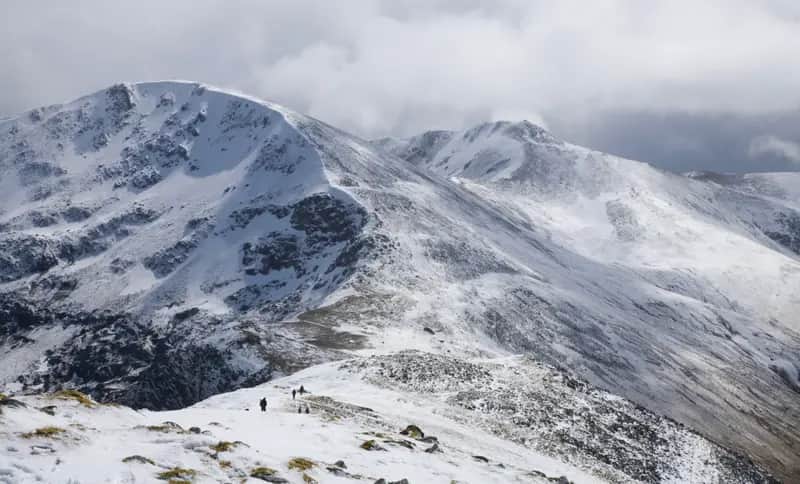THE INDISPUTABLE HEALING POWER OF THE MOUNTAINS

282 AT 82: Nick Gardner at the summit of Cairn Gorm after completing his round of Munros (Picture: Gayle Ritchie)

SUMMIT PALS: Ross on Moruisg
EVERY Munros completion is a personal triumph, each one the final step in an emotional journey that delivers so much comfort for mind and body.
Those who spend time in the mountains are in no doubt of their therapeutic power. They provide a sanctuary where cares can be left behind for a few hours and the human clock reset.
I had the privilege of being on Cairn Gorm last weekend among a seemingly endless wave of well-wishers to welcome 82-year-old Nick Gardner as he reached the final summit of the 282, a round that has taken just over two years and which has raised more than £80,000 for two causes close to his heart.
The now familiar guard-of-honour tunnel of walking poles was the longest I have seen, the alternating orange and purple charity t-shirts as bright and loud as the cheers which greeted this remarkable man. You could sense the raw emotion reverberating around the plateau.
Nick was 80 when he decided to take on the challenge. He felt he needed a focus to combat the emotional turmoil from the realisation that he could no longer look after his wife Janet, who was struck first by osteoporosis and later by Alzheimer's, and now needs full-time care.
Despite being a climber, Nick had done few of the big mountains outside of his home territory in the North-west Highlands. It would be a huge undertaking, especially at his age, but his family got on board and began sorting out the logistics.
One of the ground rules was that Nick would not be doing any solo ascents (although needless to say, necessity has meant he has on a couple of occasions). The positive face of social media proved to be the key with dozens of mountaineers rallying round, offering to accompany him on the hills, including a full traverse of the Black Cuillin.
As awareness of his mission spread, the offers of help gathered pace. My involvement came via a message from friends and I managed to join Nick for a couple of winter days, one with a group on a bluebird day in deep, soft snow, the other just the two of us chatting our way up to an ice-blasted summit. Like everyone who has met him, I was blown away by the fitness and determination of this this gently-spoken man. It never seemed there was any doubt he was going to 'compleat'.
The increasing publicity meant the charity funds kept rising and rising. Between the time we set off from Coire Cas for Cairn Gorm and an official reception some six hours later, the total had risen by another £10,000 and, just like Nick, it has continued to climb.
It may have been the final Munro of a momentous round, but Nick will be keeping his boots on for as long as possible. He admitted that he had been in a mess emotionally as he struggled to cope with Janet's worsening condition, but these days in the mountains have given him purpose and strength, both physically and mentally.
His experience has bolstered the belief that getting out regularly keeps the mind and body healthier and can help prevent the early onset of osteoporosis and Alzheimer's. His philosophy? "If you're feeling down, don't take a pill, just go for a walk."
It's a sentiment echoed by Ross Cunningham. Two weeks earlier, about 100 miles further north and two generations south, Ross was completing his Munros with family and friends on Moruisg, the culmination of a five-year circuit that started in a bid to combat depression.
Ross is a passionate campaigner on mental health issues, and his regular mountain trips have provided plenty of time for reflection on how they have changed his mindset and his life. And just like Nick, his journey has been an emotional one.
He has discovered that the mountains give you good days and not so good days but never bad days. He has found that worries are quickly dwarfed by the power of nature, by the sheer scale of the landscape and its breathtaking beauty. And he has found that as well as discovering these wild places, he has discovered a lot about himself.
It's not difficult to see why the hills have this effect. Every ascent leaves a glow, even when the wind has been howling, or the snow and rain is hammering on the horizontal, a feeling that the mind has been cleared and refreshed.
Years of night walking after finishing work at midnight taught that physical exertion was my antidote to mental tiredness. My colleagues couldn't believe I would climb mountains after a long day in the office, yet I was the one who looked and felt fresher the following day despite skipping a night's sleep.
And if further proof is needed that the mountains can have a transformative effect in times of trouble, then the words of a much-missed friend sum it up perfectly. Steve Barnes, who died last year after living with various cancers for more than 15 years, often took to the hills even in the darkest of days.
He always said that getting outdoors meant his condition became a small problem in a big space, rather than sitting at home where it would be a big problem in a small space.
The healing power of the mountains is indisputable – and it's available on repeat prescription.

